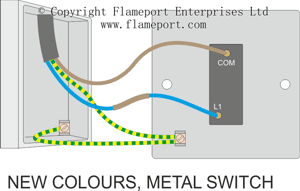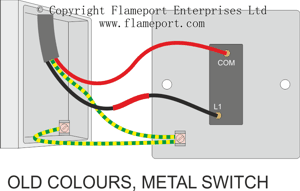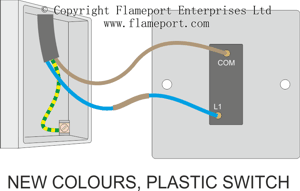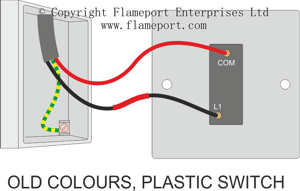One way switching - Plastic switches
One wire connects to COM, and the other wire to L1. A piece of brown sleeving is used on the blue wire, as both wires are live.
The earth wire connects to a terminal in the backbox, or to a single insulated terminal block. It must be covered with a length of green/yellow sleeving. DO NOT cut the earth wire off!
One way switching - Metal switches

 As with the plastic switch. one wire connects to COM, and the other wire to L1. A piece of brown sleeving is used on the blue wire, as both wires are live.
As with the plastic switch. one wire connects to COM, and the other wire to L1. A piece of brown sleeving is used on the blue wire, as both wires are live.
The earth wire connects to the earth terminal on the switch plate. If the backbox is metal, an additional short length of wire connects from the switch earth terminal to the backbox.
If there is no earth wire, you cannot fit a metal switch. An unearthed metal switch would become live in the event of a fault.
Now you can see why cutting the earth wire off is a bad idea - it would prevent someone from fitting a metal switch in the future.
Switch Wires
As described on the other pages, the two switch wires are both live. The switch just connects the two wires together when it is on.
DANGER As one of the switch wires will always be live, ALWAYS turn off the power at the consumer unit before replacing a light switch.
When replacing the switch, make sure that the wires are not trapped behind the plate fixing screws.
The diagrams above show the new and old colour codes.




0 Comments